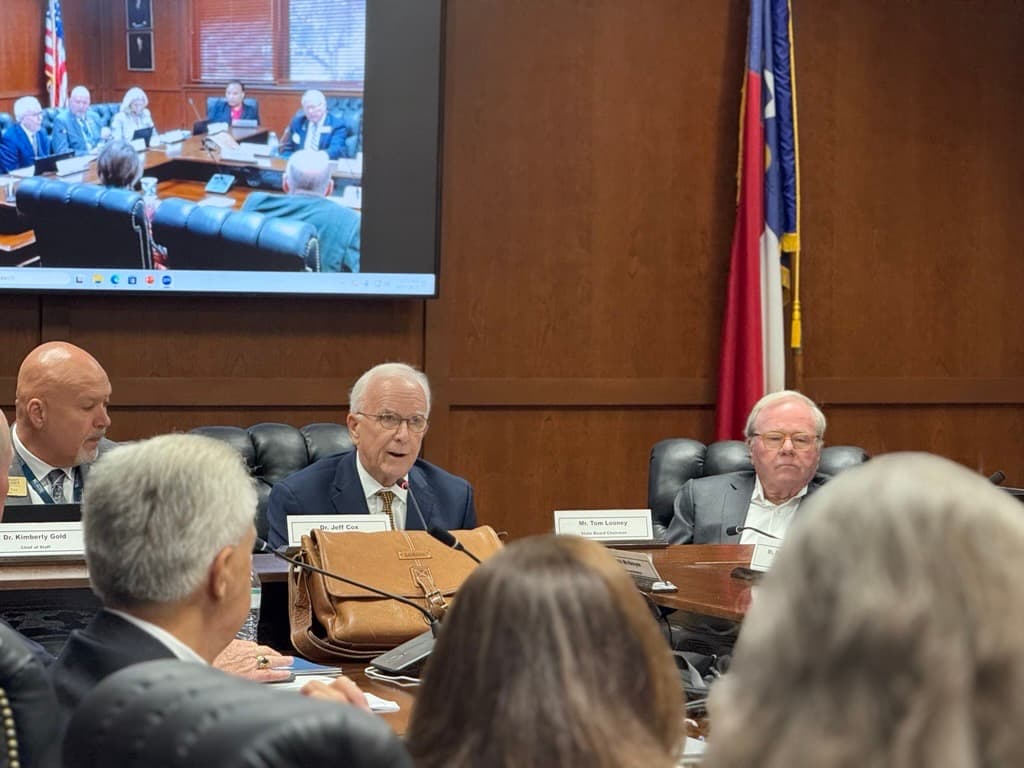State Board of NC Community Colleges Advances Strategic Plan

Published: October 23, 2025
The North Carolina State Board of Community College met October 16-17 to discuss and vote on the development of its next strategic plan, funding challenges for ApprenticeshipNC, disaster recovery lessons, transfer student success, and new state policy requirements.
The System is building momentum toward its 2026–29 Strategic Plan. Interim Vice President for Strategic Initiatives Dr. Zach Barricklow outlined outcomes from September’s summit, which launched the process.
“Our intention with the summit was not to leave it there, but to carry it forward, and build on this momentum and traction,” Barricklow said.
Nine immediate action items are already underway, focused on funding, workforce development, and systemwide priorities.
The Board will set high-level goals by January 2026, define implementation and performance indicators over the summer, and approve the final plan in September 2026.
Input will be gathered from five regional groups of college presidents throughout October, with feedback summarized in November.
“We want to make sure all co-owners of this strategic plan have an opportunity to be heard and have a stake in it,” said Dr. Dale McInnis, chair of the Board’s Strategic Planning Committee.
ApprenticeshipNC: Growth and Funding Needs
ApprenticeshipNC continues to be one of the System’s most impactful workforce programs:
- 5,241 new apprentices joined in 2024–25, bringing the statewide total to 16,446.
- 555 new high-demand occupations were added.
- 1,700 new pre-apprentices enrolled.
However, federal grants that currently fund 65% of program operations will expire in June 2026. Nearly $22 million in federal funding has fueled record growth, but the federal government shutdown has delayed modifications to current grants.
Leaders stressed that $3 million in state funding is needed to meet the Governor’s Workforce Council goal of doubling apprenticeships — a move projected to generate $2.15 billion in wages and $251 million in future tax revenue over the next decade.
Lessons from Hurricane Helene
The Board reviewed findings from the John M. Belk Endowment on the System’s response to Hurricane Helene, which affected 14 community colleges. Recommendations include:
- Developing a disaster preparedness toolkit for college leaders.
- Delivering tabletop training exercises on natural disaster response.
- Documenting System Office response protocols, including rapid support teams and policy flexibility.
Chief of Staff Dr. Kimberly Gold noted that delivering supplies and internet connectivity systems, hosting weekly recovery calls, and providing FEMA support contracts were among the most effective actions during the crisis.
Transfer Pathways Become Easier, Clearer
The Board also received a presentation from Dr. Torry Reynolds, Associate Vice President of Student Services at the System, on the Comprehensive Articulation Agreement (CAA) to make transferring from community colleges to UNC universities simpler and more consistent.
Instead of students having to figure out transfer rules at each of the 16 UNC campuses separately, the process is now clearer, more unified, and all in one place.
Data show that students who finish an associate degree before transferring do just as well—or even better—than students who start at a four-year university. Students who take more credits before transferring also do better overall.
Key Updates to the CAA
- General Education Waiver: Students who complete an AA or AS degree will no longer have to repeat general education classes once they transfer.
- Transfer Guides: Each UNC campus now provides updated guides to help students match community college courses to their chosen major. These guides are valid for four years.
- Course Updates: The process for adding or reclassifying transferable courses is clearer. The ACA 122 course (Transfer & Career Success) helps students understand their options.
- Appeals Portal: Students can now appeal transfer credit decisions online through a centralized portal—no more mailing paperwork.
- Compliance Reviews: Both UNC campuses and community colleges will undergo regular reviews to make sure the rules are applied fairly across the state.
The CAA has been helping students transfer since 1997. The 2025 revisions make the process clearer, more consistent, and more student-friendly, ensuring thousands of North Carolina students have a smoother path to earning a four-year degree.
Other Board Actions
- Reelected Dr. Bill Starling as president of Sampson Community College.
- Continued the presidential search for James Sprunt Community College.
- Approved allocations for the NC Career Coach program, including an impact evaluation.
- Approved $828,813 in corrected allocations for health care training programs at Alamance CC and Asheville-Buncombe Tech.
- Reviewed audit and cybersecurity updates on fraudulent student accounts.
- The Board has officially begun the nationwide search for the System’s next president following Dr. Jeff Cox. The process will be led by Board members with support from an advisory council of higher education, business, and government leaders. Read more here.
- The Board reviewed changes to accreditation law signed by Gov. Josh Stein. The revision allows colleges to remain with their current accreditor or pursue a new one at the end of each 10-year cycle. All 58 community colleges are accredited and in good standing.
- The Board approved a rule, effective Nov. 1, requiring dependent minor students to complete consent forms before registration to clarify parental access to education records.
The Board’s next meeting is scheduled for November 20–21, 2025.